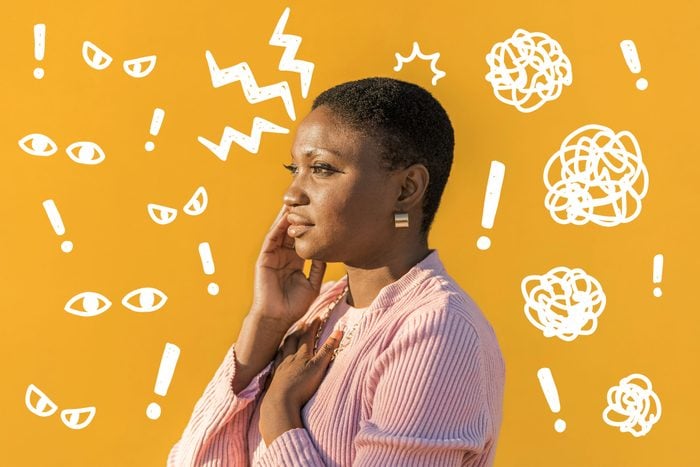Your 5 Biggest Fears and How to Face Them, According to Psychologists
Updated: Feb. 28, 2024

Is feeling afraid holding you back? Here's how to overcome your biggest fears so you can live your life to its fullest.
Everyone feels fear from time to time—being afraid is a natural response that’s kept humans alive since the caveman days. “Experiencing fear is a normal experience all humans share. The fear response is necessary to keep us safe and ultimately for our survival,” says Zachary Sikora, a psychologist at Northwestern Medicine Huntley Hospital outside of Chicago. But if our biggest fears get out of control, they can keep us from doing things that seem scary but really aren’t.
We fear failure, so we never apply for the job of our dreams or go on that blind date. We may think we’re protecting ourselves from threats, but in overestimating the danger, we’re robbing ourselves of opportunities that have the potential to build emotional strength and even change our lives. So what can you do? “The ultimate goal is to refrain from avoiding the things or situations that cause us anxiety and fear,” Sikora says.
By acknowledging your fears and taking small steps to confront them, you can gradually overcome them and get out of your comfort zone, says empowerment coach Amy Lombardo. “Remember, growth and success often lie just beyond the boundaries of your fears, and confronting your fears also fosters resilience and builds confidence,” she says. Read on as our experts help you overcome your biggest fears by learning not only how to be confident, but also how to build emotional strength and stop self-criticizing.
Get Reader’s Digest’s Read Up newsletter for more confidence tips, humor, cleaning, travel, tech and fun facts all week long.
The problem with fear
Fear becomes an issue when it stops us from living our best lives. “The most common response to fear and anxiety is avoidance,” Sikora says. “Humans look to avoid pain and seek pleasure, so it makes sense that we would avoid what activates emotional distress. When the avoidance begins to impact our daily functioning, it can have a significant impact on our quality of life.”
Does your fear make you hypercritical of yourself? Does it dictate your choices, limit your actions and prevent you from taking risks? That’s a problem, says Lombardo. “When you constantly avoid situations that make you uncomfortable or shy away from new opportunities, you miss out on personal growth and valuable experiences because of your fear,” she says. “Over time, these fears can become deeply ingrained, leading to a cycle of self-doubt and missed opportunities.”
Some of our most fundamental, biggest fears include fear of failure, rejection, loneliness, change and death—but even these fears aren’t always negative. “The fear of death might inspire us to eat healthier or take better care of ourselves, or your fear may motivate you to stop a bad habit, like smoking,” says psychotherapist Amy Morin, author of 13 Things Mentally Strong People Don’t Do. “But fear can become a problem when it holds you back from living a full life or when it interferes with work, your social life and your daily functioning. If your fear of rejection keeps you from socializing, it’s a problem. Or if your fear of failure keeps you in a job you hate, it’s also a problem.”
The difference between fear, anxiety and phobia
The type of core fears we’re talking about here aren’t related to spiders or elevators—those would be more likely called phobias, which the American Psychological Association defines as persistent fears of specific objects, activities or situations.
“A fear escalates into a phobia when the individual experiences intense levels of anxiety about a particular thing or situation that then interferes with their functioning,” Sikora says. “For example, the fear of public speaking turns into a phobia when it is a regular part of an individual’s job description, and they cannot complete this responsibility due to the intensity of their anxiety. This might result in frequent problems at work.”
Fear and anxiety are closely related and usually used interchangeably in common speech, according to the American Psychological Association. Technically, fear is a reaction to an immediate threat, whereas anxiety relates to stressing about some future or long-term situation. “Anxiety is the most common mental health problem in the United States, as well as the world,” Sikora says. “The emotion of anxiety originates in the part of the brain that is responsible for our fear response.”
But whether we call the emotion fear or anxiety, the treatment is the same. “An important factor in overcoming anxiety and fear is to identify and change problematic thinking patterns that support anxiety, [such as] catastrophizing, where we have a tendency to predict something will be worse than it actually is,” Sikora says. In addition, “it is important to remember that fear and anxiety are not life-threatening or dangerous, even though it may feel that way. Keeping this in mind ultimately helps us to confront our fears and reduce avoidance.”
Read on to find out how to do that for each of our biggest fears.
Fear of failure

One of the biggest fears that can hold you back from trying new things and reaching your potential is a fear of failure. “Failure is largely stigmatized in our society,” Lombardo says. “Frequently, it can lead to feelings of disappointment, embarrassment, lack of confidence and even shame. It may also cause us to start doubting our self-worth if we’ve believed that success defines our value.”
Morin says failure can also reinforce our beliefs that we aren’t good enough.
Failure may ironically also be one of the biggest fears of high-achieving people and perfectionists, who may experience “impostor syndrome,” a feeling that they don’t deserve credit for their success.
How to overcome it
- Shift your mindset. “Instead of viewing failure as a reflection of our worth, we can see it as a stepping stone toward success, a necessary part of a process of self-discovery,” Lombardo says. “Embracing failure means acknowledging that setbacks are a natural part of any journey and that they offer valuable lessons.”
- Think of famous failures. Remember the story about how Thomas Edison tried (and failed) to make a working light bulb a thousand times before he figured it out? Every time you fail, you gain new insight for future success. So instead of dwelling on the negative, “focus on learning from it and using that knowledge to fuel future endeavors,” Lombardo says.
- See yourself as brave. “You can work through failure by reminding yourself that failure is proof that you were brave enough to try,” Morin says. “Talk about failure, let yourself fail sometimes and use failed opportunities as a way to learn and grow stronger.” Repeating courage quotes and mantras can help.
- Gather support. “Surround yourself with a supportive network of friends, mentors or colleagues who can provide encouragement and guidance during challenging times,” Lombardo says. This might be particularly important if your fear of failure stems from a childhood of feeling like you could never please your family.
Fear of rejection
Once bitten, twice shy, as the saying goes. Rejection is one of the most painful things a person can experience, so it makes sense that we’d be fearful of it, or fearful of going through it again.
“Rejection stings,” Morin says. “It can cause you to feel as though you aren’t as good as other people. It can affect your well-being and prevent you from putting yourself out there.” Being sensitive to rejection has been shown in research to lead to a fear of intimacy as well, hindering future relationships.
Lombardo says that because we are social creatures, we all possess an inherent need for connection, and being rejected directly threatens that need by undermining our sense of acceptance and belonging. Whether you’re worried about rejection from a romantic partner, a job opportunity or a friend, this fear can stop you from getting out there again and limit your future possibilities.
How to overcome it
- Allow yourself to feel the feelings. “Getting over rejection doesn’t happen overnight. It takes time and some serious self-reflection,” Lombardo says. “One thing that can be really helpful is to actually acknowledge and deal with the pain that comes with being rejected. Let yourself feel all those emotions without judging yourself for it.”
- Find the silver lining. Realize that all rejection carries a bit of hope hidden in it. “Maybe there’s something valuable we can gain from experiencing this pain, like developing a more compassionate and loving relationship with ourselves,” Lombardo says. “Accepting rejection can be tough, but it’s actually a crucial part of personal growth.”
- When one door closes, look for another that’s open. Or as Lombardo says, think about the old country song that talks about being grateful for unanswered prayers. “Shift your perspective to see rejection as a redirect toward something even better,” she says. “We may not always feel grateful in the moment of rejection. It’s important to be gentle with ourselves and stay open to the possibilities that lie ahead.”
- Remember that one rejection doesn’t define you. “You won’t get every opportunity you try for, and rejection is an opportunity to find ways to cope with uncomfortable feelings in a healthy way,” Morin says. Then you can shift your attention to a new opportunity, Lombardo says. That’ll help you regain your confidence and once again find a sense of purpose.
Fear of loneliness

Although in some ways we’re more connected than ever, thanks to social media, that can also reinforce another of our biggest fears: being alone. “In a world that highly values constant connectivity, the idea of being disconnected can feel downright terrifying,” Lombardo says. “As social creatures, humans thrive on connection and interaction with others, and even the thought of being cut off from that can be distressing.”
The fear of being lonely stems from the belief that we need others to validate our existence and provide us with a sense of belonging, she says. Loneliness also has been shown in research to affect health, both mental and physical, so it makes sense we would look to avoid it. And on the flip side, having a sense of community can boost our well-being, so it’s no wonder we seek this out.
As with a fear of rejection, “the fear of loneliness might cause you to stay in an unhealthy relationship, or it may cause you to constantly surround yourself with people,” Morin says. “But the ironic twist is that the fear of loneliness sometimes prevents people from developing healthy connections, and therefore they feel lonelier than ever.”
How to overcome it
- Spend quality alone time. Remember, the cure for our biggest fears isn’t avoidance, so you shouldn’t simply strive to be with others all the time. “You can practice spending time alone to get more comfortable with solitude,” Morin says. “Whether you go to dinner by yourself or go for a walk without listening to music, just to be alone with your thoughts, you can learn to become more comfortable with your own company.”
- Learn the difference between being alone and loneliness. “It’s crucial to recognize that being alone doesn’t necessarily imply feeling lonely, and vice versa—being in the company of others doesn’t guarantee an absence of loneliness,” Lombardo says. “Loneliness can serve as a chance to explore personal needs, values and passions, facilitating a greater sense of self-acceptance and contentment.”
- Search for the root of your fear. “If you’re feeling lonely, it can be helpful to reflect on what’s coming up for you: What might be the underlying reasons for your loneliness?” Lombardo says. “Examine your social connections and identify areas where you may need to make changes or seek support.”
- Cultivate a sense of belonging. If you fear loneliness because you don’t have a strong support system, search for more connection with others. “The feeling of loneliness arises when one lacks a sense of belonging,” Lombardo says. “Consider the question, How might I cultivate belonging, or my ‘longing to be,’ within myself?'” Engaging in activities that bring you joy, practicing self-care, volunteering or joining community groups can provide opportunities for connection and a sense of belonging, she says.
Fear of change and uncertainty
The thought of venturing into the unknown can be daunting, whether you’re afraid of changes you might choose to make, like taking a new job, or of those that might be forced upon you, like getting laid off. “Change is uncomfortable, but it’s inevitable,” Morin says.
Why is it so scary? Change takes us out of our comfort zone. “We humans are creatures of habit. We naturally crave familiarity and predictability, so when faced with change or uncertain situations, we often feel anxious and resistant,” Lombardo says. Research has shown that our brains are literally wired to see uncertainty as a threat.
Sometimes our fear of change and uncertainty can be so strong that it keeps us stuck in dead-end jobs or relationships, or tolerating unhealthy situations, simply because we’re afraid of what might happen if we take a different path. “Change and uncertainty challenge our sense of stability and security,” says Lombardo.
How to overcome it
- Remember that change can be good. “Remind yourself that change can be for the better. While it’s uncomfortable to learn new things or shift to a new environment, you might like things better,” Morin says. This is especially true if staying stagnant may have negative consequences, such as staying in an unhealthy relationship. “It is important to remind ourselves that change can bring positive outcomes and growth too, even if it may be uncomfortable at first,” Lombardo says.
- Stay curious about the future. While acknowledging that our biggest fears of change and uncertainty are natural, and while staying grounded in the here and now, try to have a more open mind about what the future might bring. “It helps to stay curious and flexible during times of change and uncertainty, and to practice staying in the present moment,” Lombardo says.
- Give yourself credit. “You’re likely a lot more adaptable than you give yourself credit for,” Morin says. You might think you can’t handle it, but chances are you’ll adjust just fine to whatever comes your way. Focus on self-awareness: Think about what’s the worst that can happen—and how you’d deal if it did.
- Focus on what you can control. “While the unknown and the constantly changing world may be beyond your control, you always have the option to choose where to direct your attention, how to interpret things and what steps to take next,” Lombardo says. “By embracing this sense of agency, you can embrace the excitement of change and uncertainty instead of succumbing to fear.”
Fear of death
The greatest unknown in life—with the strongest certainty of it happening—is death, so it makes sense that people fear it, both for themselves and their loved ones. “Fear of death is a common fear because it represents the final goodbye and a total loss of control,” Lombardo says. “Death represents the ultimate unknown and sparks our deep-seated fears of uncertainty.”
Being afraid of death is built into our biology: It’s a primal fear that’s deeply ingrained in human nature as a survival instinct. Yet this fear has also been shown in research to be linked to mental health problems.
Of course, it’s also a guarantee. “Unlike some fears that are unlikely, death is going to happen,” Morin says. “And while it’s sad to think about how much you’ll miss your loved ones or how much they’ll miss you when you’re gone, you don’t want your fear of death to keep you from fully living.”
How to overcome it
- Accept your fear. “It’s important to remember that acceptance is not about eliminating fear entirely but rather developing a healthier relationship with it,” says Lombardo. “It can be helpful to think of acceptance of death as a gradual process, rather than an instant occurrence.”
- Focus on the here and now. “Look for ways to celebrate your life and those around you—while everyone is still alive,” Morin says. “Imagine yourself being 100 years old and looking back over your life. Think about what type of life you’ll have wanted to have created. That can help you keep things in perspective.”
- Search for meaning in life. “Accepting the fear of death is a deeply personal and individual journey. It involves confronting your mortality, understanding your beliefs and values, and finding meaning in life,” Lombardo says. “Coping strategies such as practicing mindfulness, seeking spiritual guidance, engaging in therapy or support groups, or finding solace in art and literature can all help.”
- Recognize that death is part of life. “When we cultivate a sense of acceptance and acknowledge that death is an inevitable part of life, it can help us feel less fearful,” Lombardo says. “If you can use the reality of death to focus your attention on living a meaningful and fulfilling life while you’re still here, this is a powerful way to make this fear your ally. Death can become the catalyst for living your best life.”
About the experts
- Zachary Sikora, PsyD, is a clinical psychologist at Northwestern Medicine Huntley Hospital outside of Chicago. He uses evidence-based therapies, primarily cognitive-behavioral therapy, a treatment approach that helps patients identify and change problematic thinking patterns and behaviors.
- Amy Lombardo is a certified empowerment coach as well as a yoga teacher, strategic consultant, writer, public speaker and wellness counselor. She is the author of Brilliance: A Coaching Guide to Clearing Inner Obstacles and Letting Your Authenticity Shine and the founder of Brilliance Academy, which trains and certifies aspiring coaches.
- Amy Morin, LCSW, is a psychotherapist, host of the Mentally Stronger podcast and author of six books, including 13 Things Mentally Strong People Don’t Do. In her work, she studies, writes about and gives talks on emotional strength and how to build it.
Sources:
- APA Dictionary of Psychology: “Fear”
- APA Dictionary of Psychology: “Specific Phobia”
- Frontiers in Psychology: “‘Overcoming the Fear That Haunts Your Success’ – The Effectiveness of Interventions for Reducing the Impostor Phenomenon”
- European Journal of Psychology: “The Effect of Rejection Sensitivity on Fear of Intimacy in Emerging Adulthood”
- Psychiatry Research: “The Effect of Loneliness on Distinct Health Outcomes: A Comprehensive Review and Meta-Analysis”
- Clinical Psychology Review: “Intolerance of uncertainty: Neural and psychophysiological correlates of the perception of uncertainty as threatening”
- British Journal of Clinical Psychology: “The relationship between death anxiety and severity of mental illnesses”



